How is LG vacuum cleaner repaired?
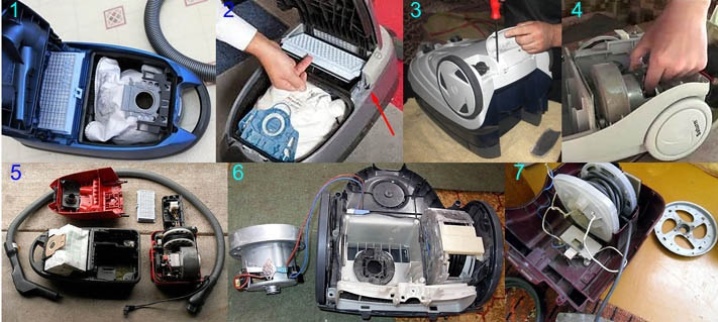
A modern vacuum cleaner is a high-tech device for cleaning upholstered furniture, carpets and clothes from household dust. Components and element base are developed taking into account modern technologies, for this reason, the vacuum cleaner has almost no minor breakdowns. The block design principle of the unit makes its use and repair as easy as possible. A well-known manufacturer of vacuum cleaners and other household appliances for cleaning the apartment is the Korean company LG (before the brand name was changed in 1995 - Gold Star).
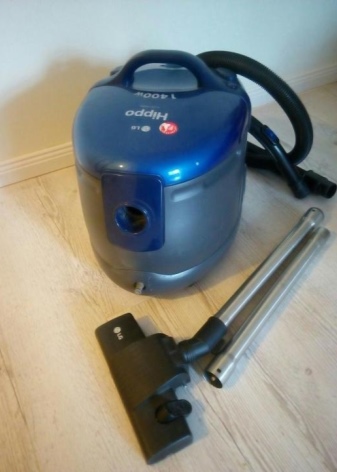
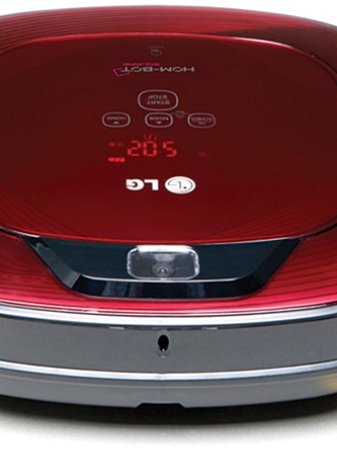
Device of various models
During the time that has passed since the invention, not only the design and appearance of the vacuum cleaner have changed significantly. Modern devices have a built-in processor and remote control. This feature enhances the safety, comfort and maintainability of modern dust cleaners.
Installation and schematic diagram of all models of LG vacuum cleaners can be found on sites on the Internet. There you can also watch a video on their disassembly and assembly with expert advice.
If you do not have the required information or have any other questions, you can email your local dealer or manufacturer.
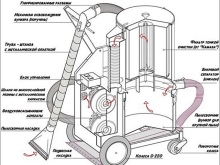
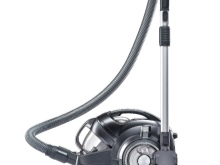
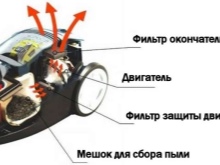
If you have uncertain knowledge of a foreign language, you can use online translators for translation, which are available on all major Internet portals. Technical descriptions and instructions do not contain complex grammatical structures. The electronic guide translates them accurately enough.
You must also remember about the loss of the right to warranty service of the product after you open the vacuum cleaner body yourself. For this reason, before the expiration of the factory warranty period (usually 12 months), it is strictly forbidden to open the case yourself and carry out any kind of maintenance and repair work.
Failure to do so will remove the devices from warranty service.
To maximize user satisfaction, the company's developers produce:
- cyclonic units;
- units for wet cleaning of premises;
- built-in carbon HEPA filters for air purification from foreign odors;
- blocks with STEAM technology for processing carpets, floor coverings and household items using superheated steam;
- built-in unit for vacuum cleaning.
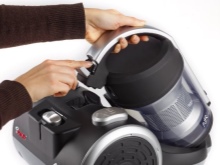


The design of individual parts and assemblies and their availability depend on the specialization of the dust cleaner. The fan impeller mounted on the shaft of a high-speed electric motor creates a high-speed air flow, which, when passing over a dusty surface, carries away dust and small particles of debris.
Debris and dust settle on a coarse cloth filter in the dust collector (in cheap models) or stick to the surface of air bubbles in the water block (in Cyclone models). The air purified from dust is thrown into the room through a hole in the body of the vacuum cleaner.
The following units are most widespread from the line of LG vacuum cleaners for home use.
LG VK70363N
Properties:
- powerful motor 1.2 kW;
- small size;
- no specialized dust collector;
- fine air filter HEPA-10;
- anther capacity - 1.4 liters;
- plastic carrying handle.
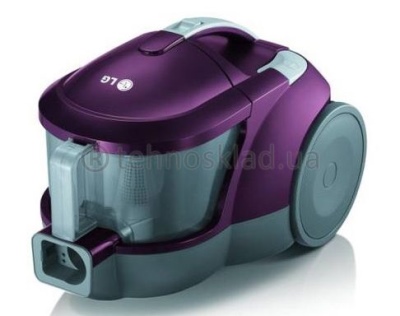
LG VK70601NU
Technical features:
- principle of action - "cyclone";
- nameplate engine power - 0.38 kW;
- dust compartment capacity - 1.2 liters;
- centrifugal proximity sensor of rotation speed;
- fine filter;
- sliding pipe;
- power cord - 5 meters;
- noise load - no more than 82 dB;
- weight - 4.5 kg.
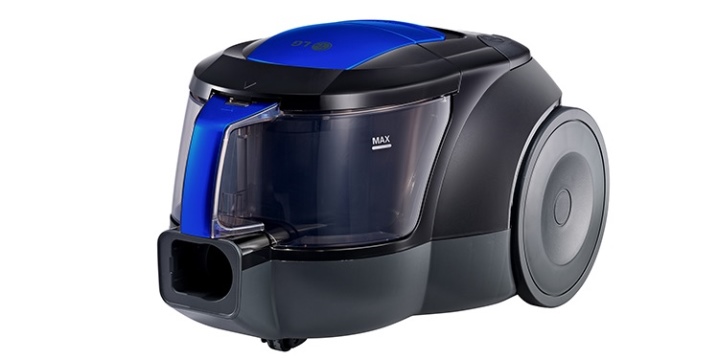
LG V-C3742 ND
Passport data:
- electric motor power - 1.2 kW;
- anther capacity - 3 dm³;
- weight - 3.8 kg.
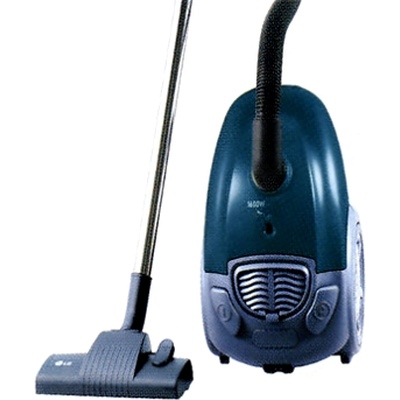
Robot vacuum cleaner R9 Master
Performance characteristics:
- full automatic;
- the possibility of training (scanning the room, reaction to whistle, flashlight light);
- movement along a given route;
- automatic search for a 220V outlet for recharging the battery;
- built-in ultrasonic water spray;
- Smart Inverter motor;
- two-stage turbine Axial Turbo Cyclone;
- built-in computer with a dual-core processor, 4Gb of RAM, 500 Gb hard drive;
- laser ultraviolet illumination;
- motion sensors on the sides of the case;
- floating suspension chassis.
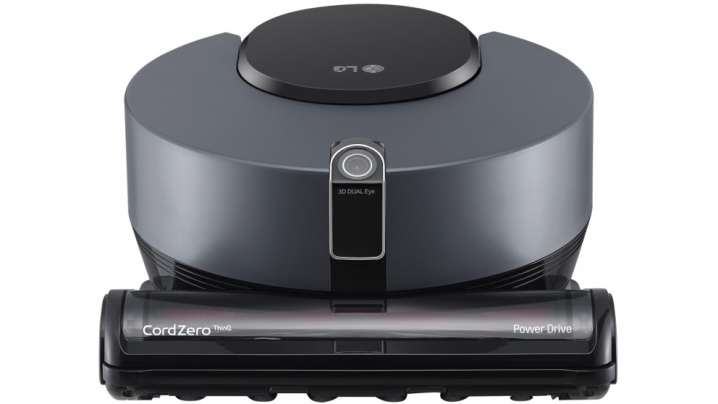
Common breakdowns
Despite the reliable design, high-quality components, assembly on the conveyor using manipulators and many hours of testing on the test bench after the assembly is completed, breakdowns occur during the operation of LG vacuum cleaners. If the malfunction appears during the warranty period, it will be eliminated free of charge in the repair shop of the service center. It is much worse if the vacuum cleaner stops working after the end of the warranty period. In such a situation, the user is faced with 3 options for solving the problem:
- very expensive paid repair of faulty equipment in the manufacturer's SC;
- selling a faulty vacuum cleaner at a ridiculous price and buying a new one in a company store at full cost;
- repair of a home assistant for cleaning dust on your own.
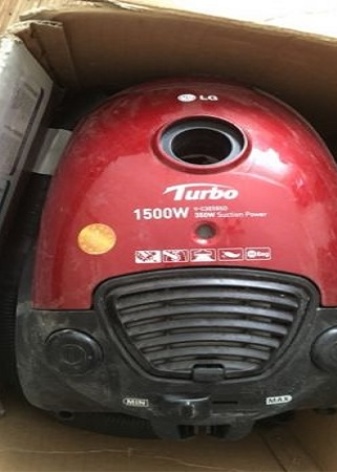
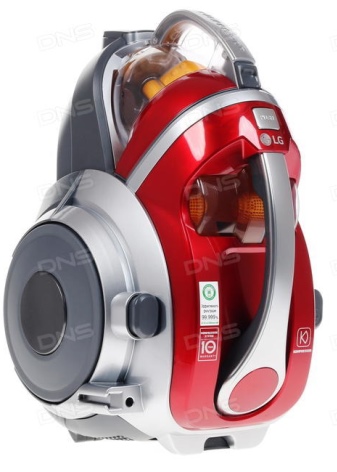
Below we will discuss typical malfunctions of LG vacuum cleaners and how to fix them at home. This will help you repair a faulty vacuum cleaner at home.
First, you need to download an electrical circuit diagram, a wiring diagram from the Internet, purchase or borrow the necessary tool:
- a set of screwdrivers (slotted and Phillips);
- pliers with dielectric handles;
- voltage indicator 220V (probe) or tester;
- dielectric assembly gloves.


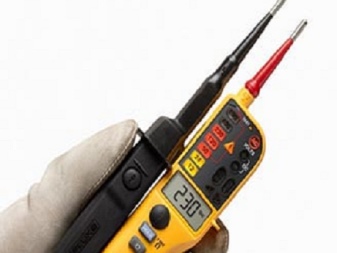

You need to pay attention to the following points:
- before starting repair work, you must turn off the vacuum cleaner from the outlet and disconnect the power cord from the case;
- when disassembling the case, do not use excessive force, so as not to damage the thread and not to rip off the slots on the head of the screws;
- during disassembly, it is necessary to draw on a sheet of paper the location of the housing screws, after unscrewing, put the screws in the appropriate places on the paper, this will facilitate the assembly process after repair.
The most common LG vacuum cleaner malfunctions include:
- the device does not suck up dust and debris well;
- the motor heats up, turns off quickly, the vacuum cleaner smells like burning;
- the vacuum cleaner periodically makes noise, overheats, turns off, hums;
- the built-in battery is not charged;
- the cord does not automatically fit into the compartment;
- the dust collector indicator is faulty;
- breakage of the brush in the washing compartment.

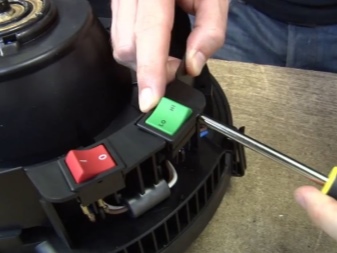
Renovation work
Consider the most common malfunctions of LG vacuum cleaners and how you can fix them yourself without going to the service.
The device does not pick up dust and debris well
Possible reasons:
- individual parts of the body do not fit tightly to each other;
- dust collector filter is dirty with dust;
- the engine is faulty;
- damaged hose (kinks or punctures);
- the brush does not fit tightly to the surface to be cleaned;
- undervoltage in an electrical outlet.
Remedies:
- check the body for gaps between the individual parts, assemble the body correctly;
- clean the filter or dust collector compartment from dust;
- check the integrity of the motor armature windings and the resistance between the armature and the windings with an ohmmeter;
- glue cracks and other defects on the surface of the hose with tape;
- measure the voltage in the electrical outlet, if it is constantly underestimated or overestimated - use an autotransformer.

The motor heats up, turns off quickly, the vacuum cleaner smells like fumes
Possible reasons:
- worn out carbon brushes;
- the engine manifold is dirty;
- damaged wire insulation;
- broken contact between live conductors;
- faulty turbine or fan bearings.
Elimination options are the same as in the previous option.
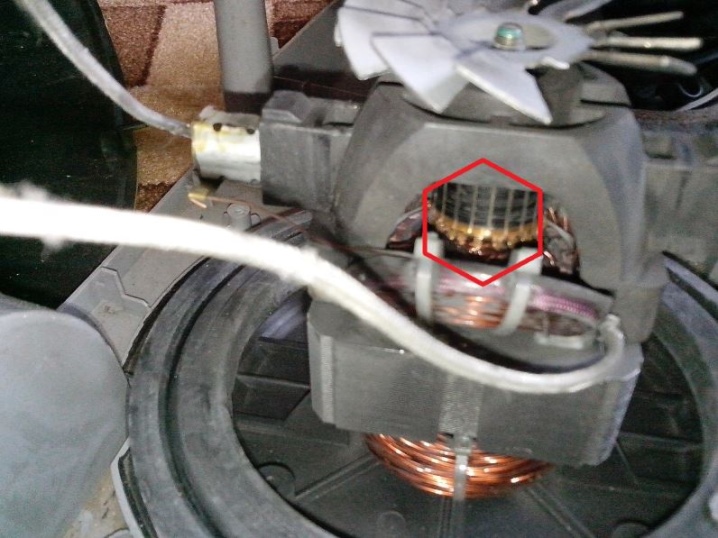
The vacuum cleaner does not turn on
Possible reasons:
- break or break in the power cord;
- switch malfunction;
- malfunction of the electrical plug;
- blown or defective fuse.
Elimination technique:
- replace the defective fuse;
- replace the power cord, plug or switch.

Built-in battery does not charge
Possible reasons:
- the battery has failed and lost capacity;
- the diode or zener diode in the charge circuit is broken;
- faulty power switch;
- defective electrical plug;
- blown or defective fuse.
Corrective measures:
- check the voltage at the battery terminals with a tester;
- measure forward and reverse resistance of a diode and a zener diode;
- change fuses.
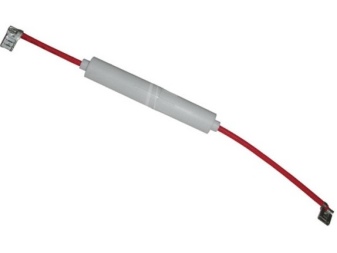

The cord does not automatically fit into the compartment
Possible reasons:
- the spring of the cord reel mechanism does not work;
- a foreign object has fallen into the stowage compartment;
- the cord eventually dried up, became tough, lost its flexibility and plasticity.
Remedies:
- disassemble the case;
- inspect the unit for debris and foreign objects in the cord routing mechanism in the enclosure compartment.

Defective dust collector indicator
Possible reasons:
- the sensor for filling the dust container is faulty;
- the indicator does not work correctly;
- open circuit in the sensor or indicator circuit.
Elimination methods:
- check the sensor and indicator, ring the electrical circuits;
- eliminate malfunctions.

Broken brush in the wash compartment
Possible reasons:
- accidental ingress of metal objects into the compartment (paper clips, screws or nails);
- the brush, the gear is poorly fixed, the latch is broken.
Remedies:
- full analysis of the compartment, removal of foreign objects;
- replace the latch if necessary.
Preventive measures
To ensure trouble-free operation of the vacuum cleaner, a number of simple rules must be followed.
- If water or other liquids get inside the case, turn off the vacuum cleaner immediately and leave it at room temperature for 12-24 hours. Failure to comply with this requirement may lead to a short circuit inside the case or to the appearance of a 220V mains voltage on the vacuum cleaner case, with the possibility of a subsequent electric shock.
- It is strictly forbidden to use the vacuum cleaner for other purposes (cleaning abrasive dust, metal shavings, sawdust).
- During the cleaning process, avoid sharp bends in the hose and blocking the inlet.
- When carrying out wet cleaning, do not pour deodorants, perfumes, solvents or other aggressive liquids into the detergent compartment.
- Do not allow the vacuum cleaner to fall from a great height; after a fall or strong impact, the unit must be taken to a service center for inspection and diagnostics.
- It is not allowed to connect the unit to an electrical network with unstable voltage.
- It is forbidden to use the device for other purposes (removal of snow, abrasive materials, granular substances).
- After each cleaning, you must clean the dust filter or debris compartment in cyclonic devices.
- It is worth using accessories recommended by the manufacturer; you cannot use homemade parts or components from other models.
In the process of work, it is necessary to strictly comply with the requirements of PTB and PUE.
For information on how the LG vacuum cleaner works and its characteristics, see below.










The comment was sent successfully.